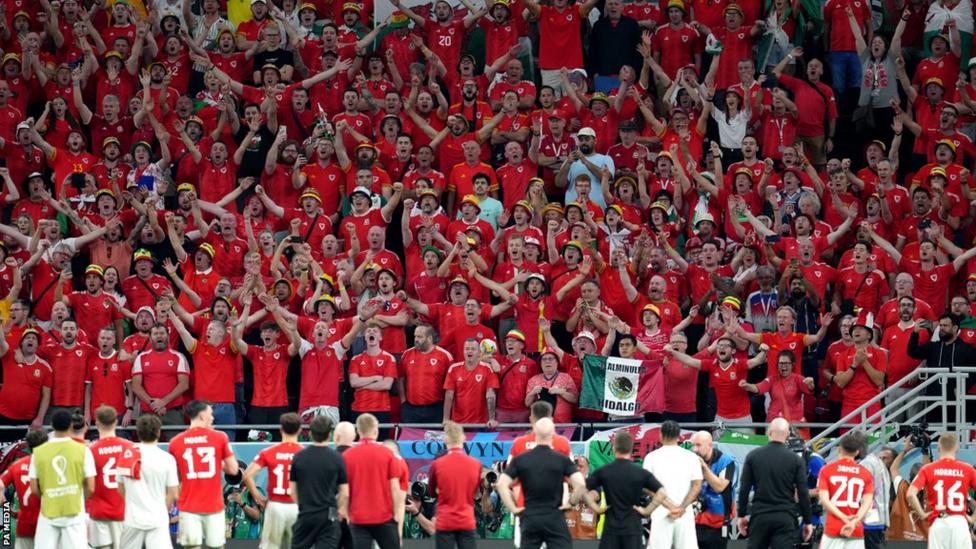As Wales players and staff shared a moment with their fans after Tuesday’s 3-0 defeat by England had sealed their group-stage exit from the World Cup, there was a sense of an ending more profound than the usual closure that comes with the conclusion of a team’s tournament.
This was, after all, Wales’ first World Cup for 64 years, the culmination of a nation’s long-held dream.
And as this dream-like state faded to black under a desert night sky in Qatar, it felt like the end of an era – or at least the beginning of its end – like no other in the country’s history.
Put simply, Wales has never had it so good. For generations, Welsh football had been synonymous with, at best, narrow misses and tales of anguish and, at worst, long spells of abject failure and outright apathy.
The longer the wait to qualify for a major tournament went on, the more the 1958 World Cup felt like a curious antique of a past too distant to comprehend.
Then after the hurt of Scotland in 1977 and 1985, Romania in 1993 and myriad false dawns, the golden generation emerged, first as teenagers under John Toshack’s guidance in the late 2000s, before blossoming under Gary Speed’s tutelage and coming of age at Euro 2016 with Chris Coleman at the helm.
That summer in France was gloriously cathartic, not only ending Wales’ 58-year wait for a major tournament but then taking the country to stratospheric new heights with a first semi-final.
Gareth Bale, Aaron Ramsey, Joe Allen and the rest followed that with qualification for a second successive European Championship but still a second World Cup proved elusive – until this year.
Now, after three group games in Qatar, the adventure is over.
As Robert Page and his players applauded the Red Wall and savoured one last rendition of Hen Wlad Fy Nhadau at Ahmad Bin Ali Stadium, the mutual love and respect was as striking as ever. Nothing could diminish the groundswell of national pride at seeing Wales back on this grandest stage of all.
And while nothing will change that fact, as well as taking the time to look back, Wales must now consider what comes next.
Wales can feel immensely proud to have qualified for a first World Cup for 64 years and, at the same time, they can be deeply disappointed by their performances in Qatar.
The build-up was justifiably epic given the historical significance but, whereas Wales have risen to the challenge in all three of their previous major tournaments to reach the knockout stages, it proved beyond them here.
There were many reasons for their failings, one of the most striking being the fading lustre of an ageing golden generation.
Bale, his country’s record goalscorer and cap holder in men’s football, has been the face of Welsh football for more than a decade, regarded by many as the greatest player to have come from Wales.
Ramsey and Allen may not be viewed in quite the same exalted light but, as their selection in Uefa’s official team of the tournament for Euro 2016 illustrated, they have been integral figures to the Welsh renaissance.
At this World Cup, however, all three were pale imitations of their former selves.
In fairness to Allen, his involvement was limited by a hamstring injury and, although Bale and Ramsey started all three matches, their dwindling club form and lack of match fitness caught up with them in Qatar.
A tight hamstring forced Bale off at half-time against England having touched the ball a mere seven times, while Allen limped off towards the end with what appeared to be a recurrence of his injury. For two icons of Welsh football, these felt like undignified ways to depart what was almost certainly their only World Cup.
Bale, who is 33, has already stated his desire to continue playing for Wales, while Allen, 32, and Ramsey, 32 next month, have yet to declare their intentions either way.
They are all young enough to influence Welsh hopes of qualifying for Euro 2024 but, even if they can help Wales play at a fourth major tournament out of five, their country cannot count on them forever.
“I’m not going to make a call on that right now,” said Page after the England game.
“The good thing is we’ve got games in March, Euro qualifiers, tough games. We’ll have a look at the squad, at the players we’ve got and, if there are young players out there that we need to push and promote, now’s the time to do it.”
Page must also consider his own role as Wales fell short in Qatar.
The former centre-back has been deservedly praised for the job he has done since succeeding Ryan Giggs in difficult circumstances, guiding Wales to the second round at Euro 2020 and taking his country to a first World Cup for 64 years.
Performances, however, have been wavering for some time. Wales have won only two of their 12 matches this year and even in those victories – in World Cup play-offs against Austria and Ukraine – they were far from convincing.
